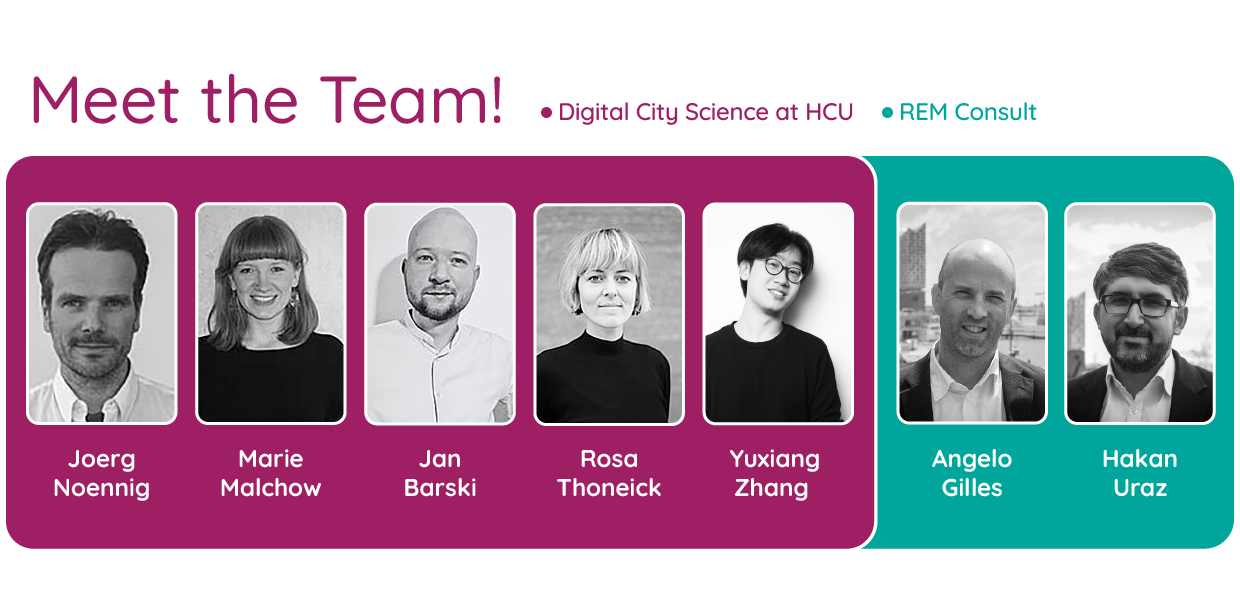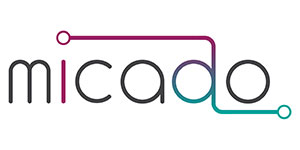
21 Nov Meet the Team – Digital City Science at HafenCity University Hamburg
Meet the team interview
The Digital City Science at HafenCity University Hamburg is a ca. 30-person academic team that carries out fundamental research on digital transformation of cities on the one hand, while on the other conducts applied innovation projects both locally and globally. Thanks to that we are recognised as competent to develop a digital solution that supports Hamburg public authorities in their daily work.
Firstly, tell us a bit about the work you do at Digital City Science at HCU.
Joerg: as Prof. for Digital City Science, I am interested in exploring digital city and society issues in the research, education, and practice projects. From this departure point we have created the MICADO project, of which I now am the Principal Investigator.
Jan: I was involved in the preparation of the original proposal, so I grew organically with project, and am now its co-manager (together with Marie). My tasks focus on having the project running smoothly, as well as on coordinating its progress with the European Commission side.
Rosa: I am mostly involved with the social science aspects of the project, which means that in the beginning of the project I was mostly reading papers to establish a common knowledge on migration research, while now I’m facilitating co-creation workshops with migrants, NGOs, and public authorities. Later I will feed my findings into the technical development.
Marie: My work for MICADO is divided between project management and social research. Thanks to this I am in a unique position of maintaining contact with all the partners and keeping on overview on the project progress, while at the same time contributing to the research aspects.
Yuxiang Zhang: At Digital City Science I create interactive web applications that facilitate urban decision-making and knowledge-management. In MICADO, my main responsibility is to facilitate the communication between the technical team and the non-technical partners while helping to design and shape the MICADO software solution.
Angelo & Hakan: Firstly, we are actually not working at the CSL but are externally contracted. As Project managers and consultants of REM Consult, we are not only familiar with large and complex EU-funded projects but also in organising and conducting all sorts of events, such as conferences and interactive workshops. As such, we consult and support the CSL team throughout the implementation of the project.
What was your motivation to developing/working in the MICADO project?
CSL’s motivation: With the Finding Places project on the one hand (that dealt with finding accommodation for refugees in Hamburg) and the Urban Data Hub on the other (that deals with urban data cockpits and dashboards), it was a logical synthesis to merge these streams into a large-scale proposal at the appearance of the EU’s ICT in Migration call.
Joerg: I am motivated by the prospect of connecting the technical opportunities, as discovered in our Urban Data Hub project, with more human-related challenges like integration and social cohesion, and investigating the power of digital tools for these issues.
Jan: I had been interested in both European projects in general and in a chance to contribute to relieving migration challenges, and MICADO presented me with a wonderful opportunity to become active in these fields.
Rosa: Having worked in small-scale, local migration projects taught me how such projects have a strong impact on a narrow group of actors. Working in a European project on these matters allows me to hope to widen that impact.
Marie: I’m excited to work in an international team of experts from five European cities on the crucial topic of migration, which is an urban reality and should be understood as that and not as an exception.
Yuxiang Zhang: On the sociological side, working on MICADO offers a deep insight into one of the most critical problems of the world. On the technical side, it would be very interesting to explore how ICT solutions could help solve real-life problems.
Angelo: Coming from an academic migration research background and transnational research projects in China and Africa, MICADO provides me the opportunity to work more practice-oriented and to contribute to the creation of solutions for real integration challenges.
Hakan: One of my most intrinsic motivations at these EU-projects is the aspect of transnational cooperation, cross-border collaboration, and the intercultural exchange to create value for the common good, as it represents a most vivid sign of European integration.
What do you think are the main challenges you will encounter during the MICADO project implementation?
Joerg: To converge the many ongoing activities, opinions, and perspectives into one product in the end. Large projects always suffer from disintegration, especially towards the end. Hope we can keep that to the lowest possible level.
Jan: Administering such a large project with fifteen partners from five cities is a challenge in any circumstances; also the prestige of the Horizon 2020 programme adds to the difficulty level in the sphere of management.
Yuxiang Zhang: Good ideas fail to be realized because of lack of data, unfriendly UI, low service availability…
Angelo & Hakan: We think indeed the challenges are similar in each of this kind of projects: creating a common understanding and coordinating among partners with such diverse backgrounds as well as within such decentralised structure is always a tough nut to crack.
What do you hope to achieve by the end of the project?
Joerg: To reach a new level of humanness in dealing with migrant integration, and to use all the powers of new digital technologies for that.
Rosa: I would love for MICADO to improve the systemic approach to migration by helping public authorities adapt to migration as urban reality and by empowering individuals.
Marie: I hope that MICADO, possibly a future version of it, will become a well-known application that newcomers recommend to each other because it is of real help.
Yuxiang Zhang: Building a stably working system of high usability and popularity.
Angelo & Hakan: Well-invested efforts into a human-centred digital solution to relieve some of the most pressing issues of socioeconomically and culturally integrating into a new society.
What do you personally find most interesting/exciting about the project?
Joerg: That special atmosphere when creative and dedicated people who enjoy their work and love to exchange ideas meet. I am happy that we are that kind of team – from different walks of life and academic backgrounds. Amazing!
Jan: Firstly, the chance to work with and learn from wonderful, interesting people from the Consortium; secondly, the chance to experience the operation of a Horizon project from the inside.
Rosa: I am excited with the fact that MICADO draws from research and applies the learnings in a real-life product.
Yuxiang Zhang: All partners are very collaborative and motivated to share their brain power, knowledge and resources.
Angelo: Although integration happens mostly local, it is an EU-wide issue and societal challenge to which the European Union should find a common solution. By being part of MICADO, I am excited to add to such a common solution while at the same time working with the local actors in Hamburg.
Hakan: Working together with passionate people of the partner organisations within this dynamic atmosphere on the project level but equally also collaborating with the communities on the city-level in Hamburg.
